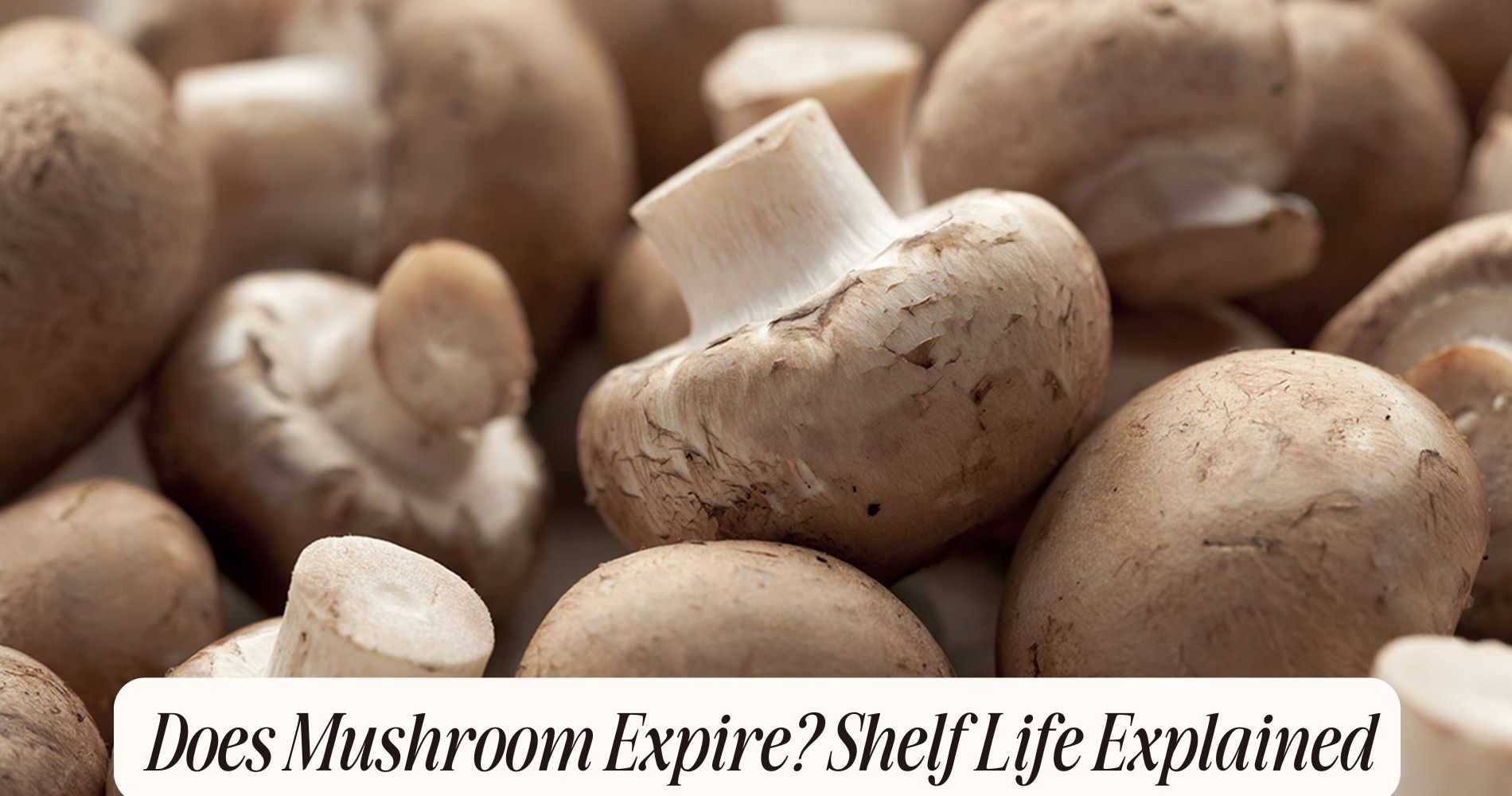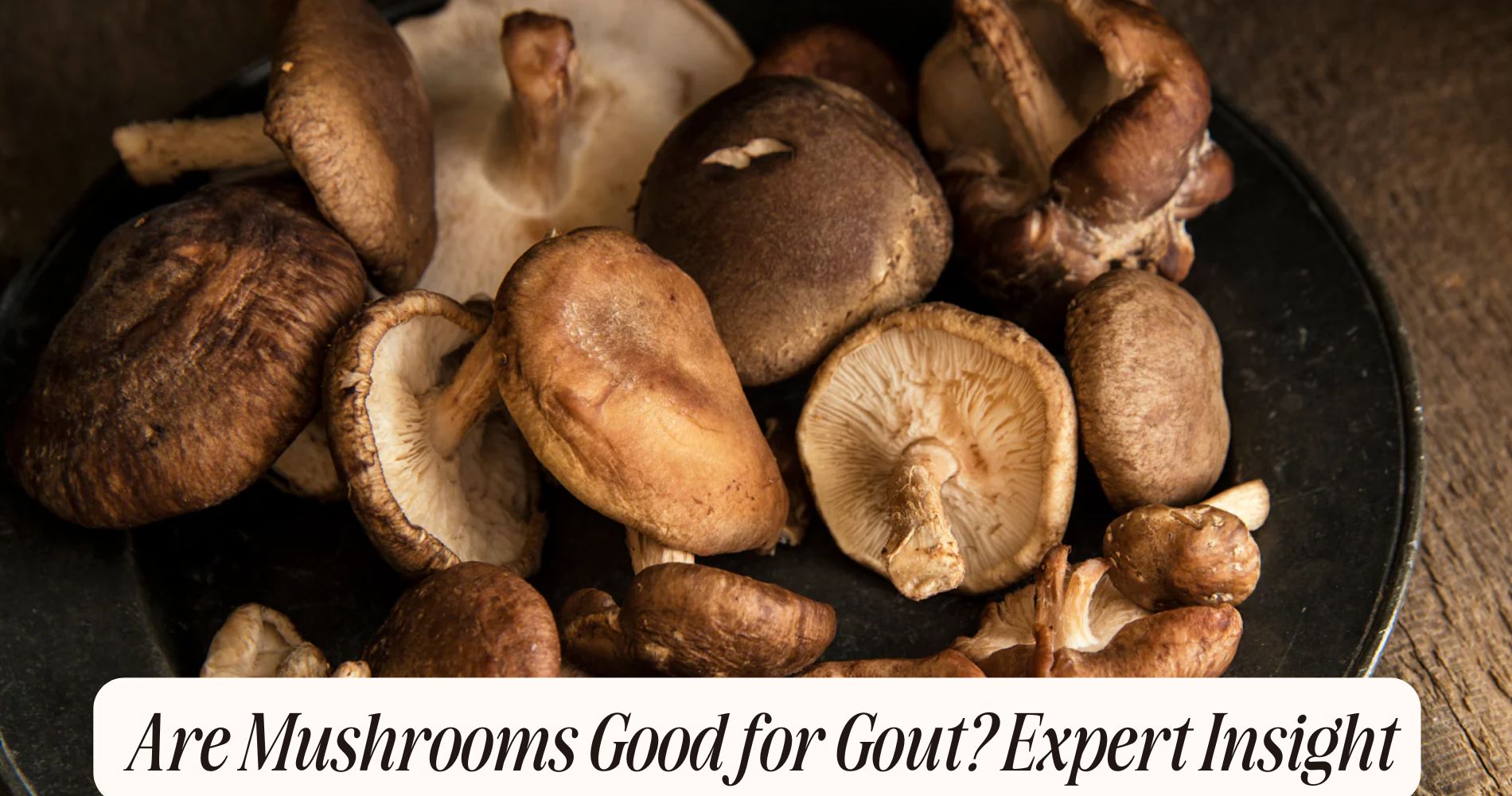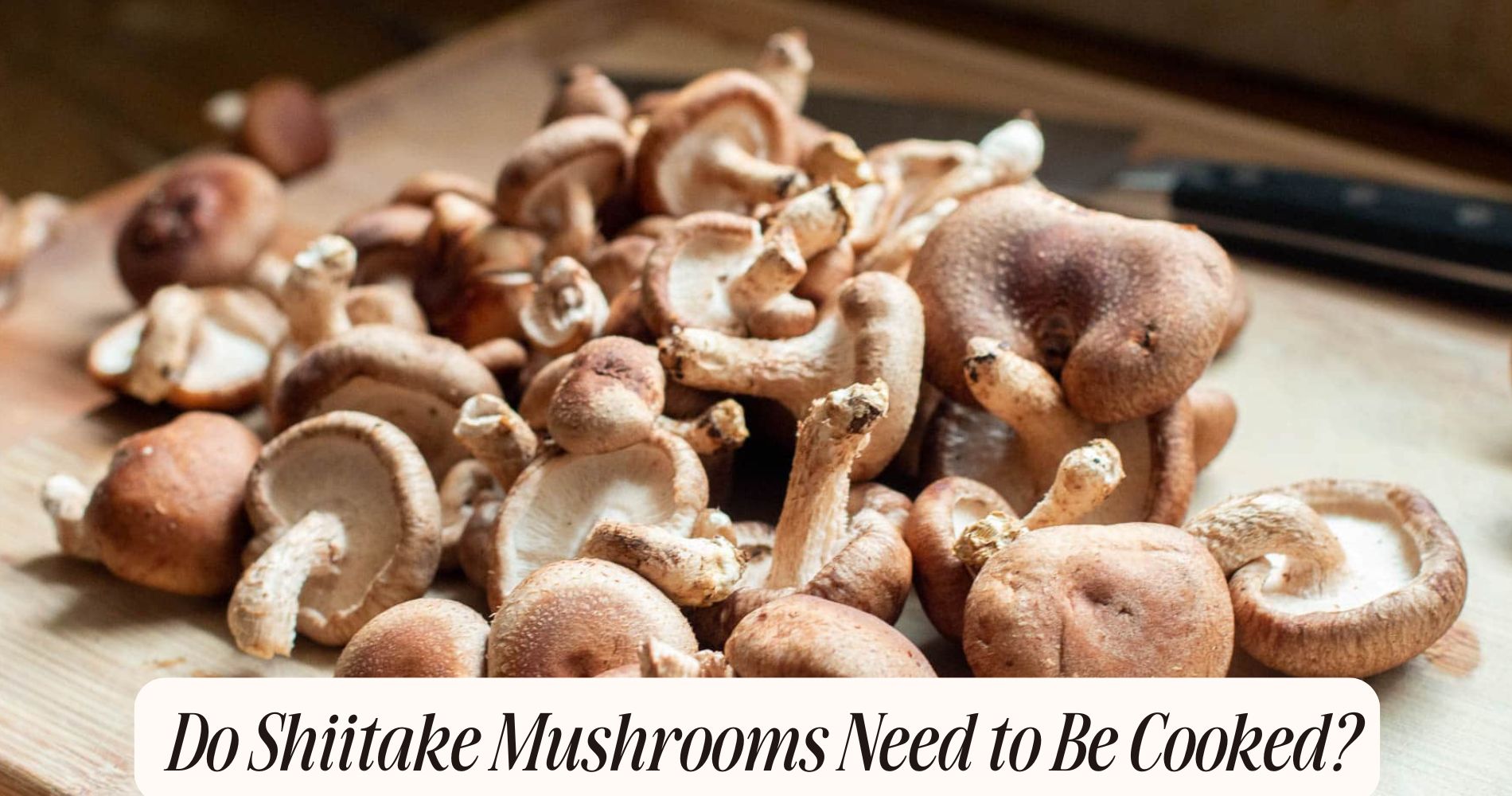
Does Mushroom Expire? Shelf Life Explained
Does mushroom expire? Yes, mushrooms do expire, and their shelf life varies. Fresh mushrooms last about 5-7 days in the fridge if you store them properly, while cooked ones can stay good for 3-5 days. Dried mushrooms, on the other hand, can last 1-2 years if kept in airtight containers. Always check for signs of spoilage like discoloration, sliminess, or foul odors, as these indicate they've gone bad. Proper storage techniques can help extend their life. If you want to know more about keeping your mushrooms fresh and tasty, there's a lot more to explore.
Understanding Mushroom Expiration
When it comes to mushrooms, understanding expiration is vital to guarantee you're consuming them at their best. Different mushroom varieties have unique characteristics that affect their freshness and shelf life. For instance, button mushrooms may last longer than more delicate varieties like chanterelles or oyster mushrooms. Knowing these distinctions helps you choose the right mushrooms for your culinary uses.

It's important to inspect your mushrooms regularly. Look for signs of spoilage such as discoloration, sliminess, or an off-putting odor. Fresh mushrooms should be firm, dry, and have a pleasant earthy aroma. If you notice any of these spoilage signs, it's best to discard them to avoid foodborne illnesses.
You should also pay attention to how you store your mushrooms. Keeping them in a paper bag in the fridge can help maintain their freshness longer than plastic wrap.
Additionally, consider using mushrooms in your dishes as soon as possible, especially the more perishable varieties. By staying vigilant about mushroom expiration, you'll not only enhance your cooking but also make sure your meals are safe and delicious.
Fresh Mushrooms Shelf Life
When it comes to fresh mushrooms, how you store them can make a big difference in their shelf life.
You'll want to keep an eye out for signs of spoilage, like discoloration or an off smell, to guarantee your mushrooms stay fresh.
Let's explore the ideal storage conditions and what to watch for to keep your mushrooms at their best.
Ideal Storage Conditions
Proper storage conditions are vital for maintaining the freshness and extending the shelf life of mushrooms. To guarantee your mushrooms remain in top shape, focus on two key factors: humidity levels and temperature control.
First, the ideal temperature for storing fresh mushrooms is between 34°F and 38°F (1°C to 3°C). Keeping them in this range prevents spoilage and helps retain their texture and flavor. A dedicated refrigerator is usually the best option, as it provides consistent temperature control.
Next, humidity levels play an important role. Mushrooms thrive in a humid environment but can become slimy if exposed to excessive moisture. Aim for around 85% humidity.
You can achieve this by placing your mushrooms in a breathable paper bag or a container with ventilation holes. Avoid plastic bags, as they trap moisture and lead to faster decay.
Signs of Spoilage
After a few days in storage, it's essential to check your fresh mushrooms for signs of spoilage. Start by looking for any mushroom discoloration; fresh mushrooms should maintain their original color. If you notice dark spots or browning, that's a clear indicator of spoilage.
Next, pay attention to texture changes. Fresh mushrooms should feel firm and smooth to the touch. If they've become slimy, mushy, or overly soft, it's time to toss them out.
Additionally, a foul or sour smell is another red flag; mushrooms should have a mild, earthy scent.

You also want to inspect for any visible mold. While a little moisture is normal, any fuzzy growth or unusual spots means your mushrooms have gone bad.
Always remember that freshness is key. When you notice any of these signs, it's best to err on the side of caution and discard the mushrooms.
Enjoying fresh, high-quality mushrooms not only enhances your meals but also guarantees you're eating food that's safe and healthy. Keep these tips in mind to make the most of your mushroom storage!
Dried Mushrooms Longevity
Storing dried mushrooms correctly can greatly extend their shelf life, making them a valuable ingredient in your pantry. When you keep them in a cool, dark, and dry place, they can last for one to two years, maintaining their flavor and nutritional benefits. This longevity is perfect for those who love to experiment with culinary uses, as dried mushrooms can enhance soups, stews, and risottos.
To maximize their shelf life, use airtight containers or vacuum-sealed bags. Avoid exposure to moisture, heat, or direct sunlight, as these factors can lead to loss of quality. Remember, even though dried mushrooms can last a long time, it's important to check for any unusual smells or flavors before using them in your dishes.

Keep in mind that rehydrating dried mushrooms before cooking is significant; it helps to release their rich flavors and textures. This versatility not only adds depth to your meals but also allows you to enjoy their nutritional benefits, such as vital vitamins and minerals.
Signs of Spoilage
When it comes to dried mushrooms, recognizing the signs of spoilage is essential for guaranteeing your dishes remain safe and flavorful. First, check for mushroom discoloration. If you notice any unusual colors, like dark spots or an overall faded appearance, it's a sign that your mushrooms might be past their prime. Freshly dried mushrooms should have a consistent color throughout.
Next, pay attention to texture changes. Dried mushrooms should feel firm and slightly brittle when you handle them. If they feel excessively soft, sticky, or have an unusual texture, it's time to toss them. Spoiled mushrooms may also emit an off-putting odor, so trust your sense of smell.
Additionally, inspect the packaging for any signs of pests or moisture, as these can lead to spoilage. If the mushrooms have been exposed to moisture, they can develop mold, which is another clear indicator that they're no longer safe to use.
Factors Affecting Shelf Life
When it comes to mushroom shelf life, several key factors come into play.
Your storage conditions, the type of mushroom you're dealing with, and how fresh they were at purchase can all greatly impact their longevity.
Understanding these elements will help you keep your mushrooms in the best shape possible.
Storage Conditions Impact
Although mushrooms can be a delicious addition to your meals, their shelf life is heavily influenced by storage conditions. If you want to keep your mushrooms fresh for as long as possible, you need to store them correctly.
First, always keep them in a cool, dark place. A refrigerator is ideal, as it helps slow down spoilage.
If you know you won't use them right away, consider freezing mushrooms. This method can greatly extend their shelf life, but it's best to blanch them first to maintain their texture and flavor. After blanching, you can store them in airtight containers or freezer bags.
Another effective way to preserve mushrooms is through vacuum sealing. This process removes air, which can cause mushrooms to spoil faster. By vacuum sealing, you're creating an environment that limits moisture and bacteria, extending their usability.
Don't forget to label your containers with dates, so you know when to use them.
Type of Mushroom
The type of mushroom you choose plays a crucial role in its shelf life. Different mushroom varieties have unique characteristics that affect how long they last. For instance, common options like button and cremini mushrooms tend to have a shorter shelf life compared to more robust varieties like portobello or shiitake. This is primarily due to their moisture content and how they're harvested and handled.
When it comes to culinary uses, delicate mushrooms like enoki may spoil faster than heartier options, making them less ideal for long-term storage. If you often cook with specific varieties, it's important to understand their shelf life to minimize waste.

You might also find that dried mushrooms, such as porcini or chanterelles, can last much longer than their fresh counterparts. They're perfect for adding flavor to dishes while providing a longer shelf life.
Ultimately, selecting the right mushroom variety not only enhances your dishes but also guarantees you get the most out of your purchase. Stay informed about the shelf life of your favorite mushrooms, and you'll enjoy fresh ingredients for longer.
Freshness at Purchase
Freshness at purchase is vital for maximizing the shelf life of mushrooms. When selecting mushrooms, you need to pay attention to various freshness indicators to guarantee you're getting the best quality. Different mushroom varieties, like button, shiitake, or portobello, may have unique signs of freshness, so it's essential to recognize what to look for.
First, check the color. Fresh mushrooms should have a vibrant hue, free from dark spots or discoloration.
Next, assess their texture; they should feel firm, not slimy or mushy. Smell is another key freshness indicator; a pleasant, earthy aroma signals quality. If you detect an off or sour smell, it's best to choose another batch.
Also, consider the packaging. If you're buying pre-packaged mushrooms, make sure the container is intact and free from moisture buildup, as this can indicate spoilage.
Finally, if you're buying from a local market, don't hesitate to ask the seller about the harvest date. By keeping these factors in mind, you can select mushrooms that not only taste great but also last longer in your kitchen.
Proper Storage Techniques
Storing mushrooms properly is essential to maintaining their flavor and texture. To keep your mushrooms fresh, always place them in a paper bag rather than plastic. Paper allows for proper airflow, preventing moisture buildup that can lead to spoilage.
Store them in the refrigerator, ideally in the vegetable drawer, where the temperature is cooler and more stable.
Avoid washing your mushrooms before storing them, as excess moisture accelerates decay. When you're ready to use them, clean them gently with a damp cloth or a soft brush to remove dirt.
If you plan to keep mushrooms for an extended period, consider preservation methods like sautéing or grilling them first. Cooking techniques such as these can enhance their flavor and allow you to store them in airtight containers in the freezer.

Never stack mushrooms too high in your refrigerator; this can crush them and affect their texture.
Finally, always check for any signs of spoilage, such as sliminess or unusual odors, before using. By following these proper storage techniques, you'll guarantee that your mushrooms stay fresh, flavorful, and ready for all your culinary creations.
Minimizing Waste With Mushrooms
Often, people overlook ways to minimize waste with mushrooms, but there are plenty of strategies to make the most of this versatile ingredient. First, think about using every part of the mushroom. Instead of discarding stems, incorporate them into your mushroom recipes for soups or stir-fries. They add flavor and texture, ensuring nothing goes to waste.
If you find yourself with leftover mushrooms that are starting to wilt, don't throw them out just yet. You can sauté or roast them and then freeze for later use. This way, you'll always have a tasty addition ready for your next meal.
When your mushrooms have truly reached the end of their shelf life, consider composting mushrooms. They're rich in nutrients and can enhance your compost pile, returning valuable elements back to the earth. Just make sure they're not moldy or contaminated.
Enjoy Long-Lasting Benefits with SUPER MUSHROOM GUMMIES
If you’re concerned about questions like "Does mushroom expire?" and want a reliable way to enjoy their health benefits, Well Gummies' SUPER MUSHROOM GUMMIES are the perfect solution. These vegan gummies combine 10 functional mushroom types, providing immune support, enhanced focus, and balanced energy—all without the worry of spoilage. With a fresh wild berry flavor, they’re delicious, convenient, and shelf-stable, making them easy to incorporate into your daily routine. Say goodbye to storage concerns and enjoy consistent wellness with SUPER MUSHROOM GUMMIES!
Frequently Asked Questions
Can I Eat Mushrooms Past Their Expiration Date?
You shouldn't eat mushrooms past their expiration date. Check for freshness indicators like discoloration or a slimy texture. Following safe consumption practices helps you avoid potential foodborne illnesses and guarantees you enjoy your meal safely.
How Can I Tell if Dried Mushrooms Are Still Good?
To tell if dried mushrooms are still good, check for color changes, off smells, or signs of moisture. Proper dried mushroom storage helps maintain quality, so make certain they're kept in a cool, dry place.
Are There Any Health Risks With Expired Mushrooms?
When you consume expired mushrooms, you risk health implications. Look for mushroom spoilage signs like off smells, discoloration, or sliminess. Eating spoiled mushrooms could lead to food poisoning, so always check before cooking.
What Types of Mushrooms Have the Longest Shelf Life?
When considering mushrooms with the longest shelf life, focus on dried varieties. Proper storage conditions, like cool, dark, and dry environments, help maintain their quality, allowing you to enjoy them for months or even years.
Can I Freeze Mushrooms for Extended Storage?
Yes, you can freeze mushrooms for extended storage. Use proper freezing techniques, like blanching, and place them in airtight storage containers. This helps maintain their texture and flavor, ensuring they're ready for future meals.
Conclusion
To summarize, knowing how to store and recognize the signs of spoilage can help you enjoy mushrooms at their best. Fresh mushrooms typically last about a week in the fridge, while dried ones can last for years. By following proper storage techniques and being mindful of their condition, you can minimize waste and make the most of these delicious fungi. So, keep an eye on your mushrooms, and savor their unique flavors without worry!




